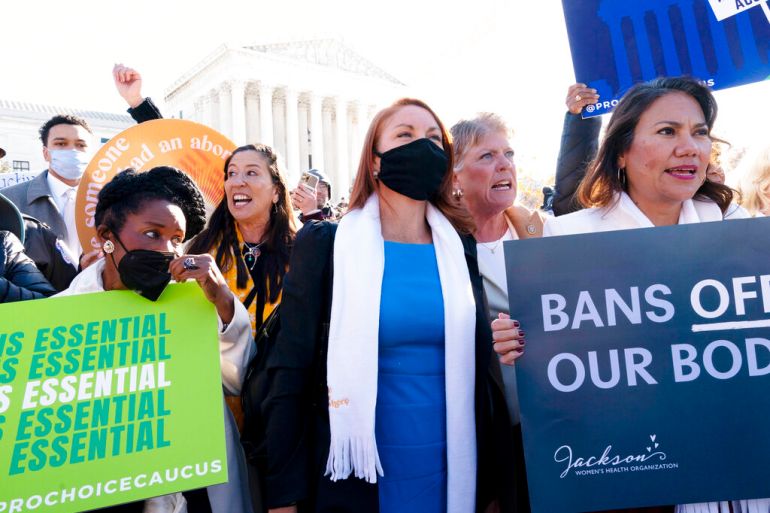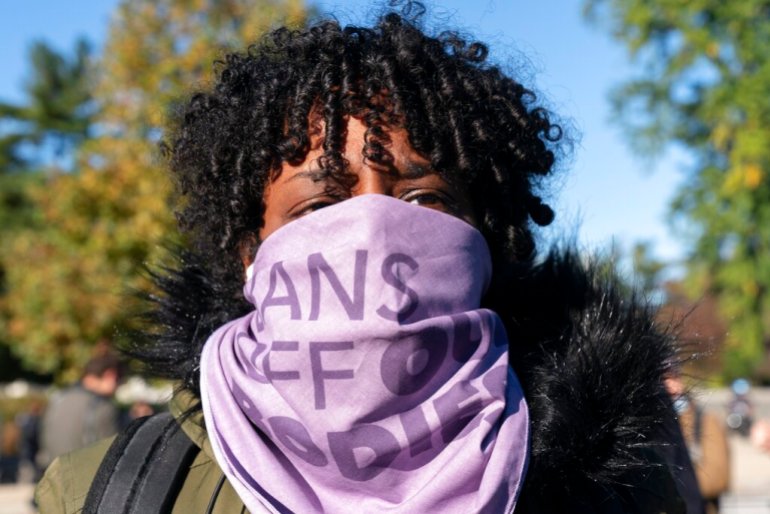US top court allows challenge to Texas abortion ban to proceed
Ruling lifts a block on lower court proceedings, but allows law that bars abortions after six weeks to remain in effect.

The United States Supreme Court has ruled that abortion providers in Texas can challenge the constitutionality of the state’s new law banning most abortions, while allowing the controversial Texas law to remain in force.
The procedural ruling, issued on Friday, lifts a block on lower court proceedings, which may pave the way for a US federal judge to block the law at least in part. But most women in Texas must continue to travel to other states to obtain an abortion.
Keep reading
list of 4 itemsUS prepares for Supreme Court showdown on abortion rights
US Supreme Court’s refusal to block Texas abortion law
US Supreme Court hears challenges to Texas abortion ban
The country’s top court, which currently has a 6-3 conservative majority, heard arguments in the case on November 1.
“We won, on very narrow grounds. Our lawsuit can continue against the health department, medical board, nursing board and pharmacy board,” Whole Woman’s Health, the abortion provider that challenged the law, wrote on Twitter.
“We’d hoped for a statewide injunction, but no clear path to it. Rest assured, we will NOT stop fighting.”
The Texas law, which came into effect in September and bans abortions after six weeks of pregnancy – before most women even know they are pregnant – is at the forefront of a growing battle over access to abortion in the US.
The Supreme Court heard arguments earlier this month in a Mississippi case that could ultimately overturn nearly 50 years of federally protected abortion rights, which were granted in a landmark 1973 decision known as Roe v Wade.
In a separate ruling on Friday, the top court dismissed a challenge to the Texas law brought by the US Department of Justice.
President Joe Biden said he “is very concerned” about the court’s decision to allow the Texas law to remain in effect “given the consequences the law has for women in Texas and around the country”.
“While it is encouraging that the Court ruled that part of the providers’ lawsuit may continue, this ruling reinforces that there is so much more work to be done—in Texas, in Mississippi, and in many states around the country where women’s rights are currently under attack,” Biden said in a statement.
The Texas law’s novel enforcement mechanism allows private citizens to pursue damage claims against anyone who provides or assists in abortion services, forcing most abortion providers in Texas to shut down.

The Supreme Court’s ruling on Friday likely sends the case back to a US District Court judge in Texas who already blocked the law as unconstitutional.
But any lower court decision would be reviewed by the conservative Fifth Circuit Court of Appeals, which has twice voted to allow enforcement of the Texas ban. Split decisions likely would set up another appeal to the Supreme Court.
The decision came a day after a state court judge in Texas ruled that the law’s enforcement, which rewards lawsuits against violators with judgments of $10,000, is unconstitutional, yet left the law in place, The Associated Press reported.
Abortion providers and the Biden administration argue that the law violates a woman’s constitutional right to terminate a pregnancy – recognised in Roe v Wade – and is impermissibly designed to evade federal judicial review.
In September, the month the law went into effect, the number of abortions in Texas fell by 50 percent compared with a year earlier, according to a study by researchers at the University of Texas that examined data from 19 of the state’s 24 abortion clinics.
Meanwhile, women who leave Texas seeking an abortion have had to travel beyond neighbouring states, where clinics cannot keep up with the increase in Texas patients, according to a separate study by the Guttmacher Institute.